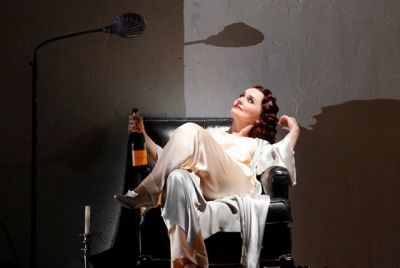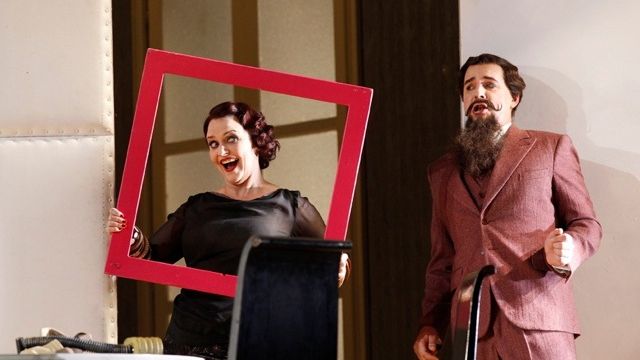Partenope
There is a very good reason why Handel’s (slightly) sexy and (purportedly) satirical opera is rarely performed. It really isn’t very exciting, despite Director Alden’s attempt to drag it into the 20th Century. Set now in the Art Deco 1920s (a time of some of the most outrageous and sensual music ever written, and of elegance and daring in society) Handel’s exploration of sexual manners and cross dressing (with more than a passing head-nod to Shakespeare) needs all the help it can get in terms of production. And so we have the suitors, the Queen, the disguise, the mistaken identity and the supposed sexual shenanigans. Strangely, by setting the piece in a permissive era, it seems more twee and less sexual than it must have done in Handel’s time.
The Baroque score is repetitive – a series of arias, each one sung three times with little variation of context and emotion. There is little vocal interaction and thus little chance for character growth. The English translation shows up the endless repetition of a sometimes banal line ad-nauseum. And the profanities and horribly cheesy lyric rhymes actually detract from the quality of the singing. Oh how I longed for a strong quartet, or even a sublimely lyrical chorus. Alden’s direction works hard to make the often dull music zing with sensuality and there are attempts to inject raunchiness and even farce into the proceedings. But fellatio on a banana and writhing on a staircase, whilst nude lovers in broad strokes are drawn on the wall are too little to suggest the sexiness that the Libretto demands to make the music relevant. The physical comedy borders on slapstick but is too infrequent and tentatively interwoven in the action. Even the injection of 4 letter words and other coarseness do little to shock or excite and seem out of place. The beautiful white set by Andrew Lieberman takes our breath away, but it also takes the light away, reflecting it back at the audience and often leaving the cast in unintentional shadows. (There are plenty of beautiful intentional shadows.) It’s overpowering and often pulls focus from the small cast. The whole thing is just too tame to be exciting.

But, whatever the perceived shortcomings, ultimately it is the singing that counts…and what fine singing it is. Emma Matthews is vocally stunning and full of exuberance. Would we expect anything less from our brightest star? If her trills and the ability to reduce her chest register to the merest whisper of a delicate headnote do not give you goosebumps, well then you really shouldn’t be at the Opera. Her arias at the end of Act One and Act Two were the highlights of the evening. She injects the most energy and excitement into the production, as we would expect. Mezzo Catherine Carby, singing the traditionally tenor role of Arsace, is totally convincing and has a wonderful mellifluous roundness to her tone. Victoria Lambourn ( Rosmira disguised as Eurimene) is vocally impressive but her slight physique makes it hard to believe her as a man. Counter-tenor Christopher Field is delightful as Armindo and Kanen Breen shows a real comic talent along with his fine singing. Richard Anderson’s effete bass Ormonte shows that beautiful sounds can be produced even with your tongue firmly in your cheek. And how amazing it was to see all six singers flat on their backs on the stage, while still singing sublimely. The Orchestra, conducted by Anthony Legge, did great service to the Baroque era, with Anthony Hunt’s harpsichord playing a standout. If only there had been more joy and energy overall.
Coral Drouyn
Images: Emma Matthews as Partenope and Richard Anderson as Ormonte & Emma Matthews as Partenope. Photographer: Jeff Busby.
Subscribe to our E-Newsletter, buy our latest print edition or find a Performing Arts book at Book Nook.

